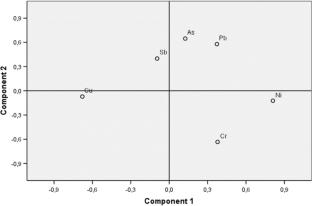Trace metal contamination status in soils of the abandoned gold mining district of Bindiba (East Cameroon): Pollution indices assessment, multivariate analysis and; geostatistical approach
Abstract
Abstract
In this study, contamination by trace metals (TMs) such as Cr, Ni, Cu, As, Pb and Sb in the soils of the Bindiba mining district was assessed. This study aims to reveal the current status of the soil quality of the abandoned gold mining district of Bindiba and provide a scientific basis for its future remediation and overall management. 89 soil samples were systematically collected and characterized in order to determine the concentration of TMs (Cr, Ni, Cu, As, Pb and Sb). To assess the degree of metallic contamination, pollution indices were employed. Both multivariate statistical analysis (MSA) and geostatistical modelling (GM) were used to identify the potential sources of TMs elements and to determine the values of the modified contamination degree (mCd), the Nemerow Pollution Index (NPI) and the potential ecological risk index (RI) at un-sampled points. The results of trace metals (TMEs) characterization showed that the concentration of Cr, Ni, Cu, As, Pb and Sb ranged from 22.15–442.44 mg/kg, 9.25–360.37 mg/kg, 1.28–320.86 mg/kg, 0–46.58 mg/kg, 0–53.27 mg/kg and 0–6.33 mg/kg, respectively. The mean concentration of Cr, Cu and Ni exceeds the continental geochemical background values. The Enrichment Factor (EF) assessment indicates two categories of enrichment: moderately to extremely enrichment for Cr, Ni, and Cu and deficiency to minimal enrichment of Pb, As and Sb. Multivariate statistical analysis shows weak linear correlations between the studied heavy metals and suggests that these metals could not come from the same origins. The geostatistical modelling based on the values of mCd, NI and RI suggests a potential high pollution risk existed in the study area. The mCd, NPI and RI interpolation maps showed that the Northern part of the gold mining district was characterized by a high degree of contamination, heavy pollution, and considerable ecological risk. The dispersion of TMs in soils could mainly be attributed to anthropogenic activities and natural phenomena (chemical weathering or erosion). Appropriate measures should be taken to manage and remediate the TMs pollution in this abandoned gold mining district in order to reduce its negative effects on the environment and health of the local population.


 求助内容:
求助内容: 应助结果提醒方式:
应助结果提醒方式:


